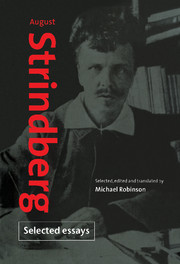Book contents
- Frontmatter
- Contents
- Notes on the text
- Introduction
- from Vivisections (1887)
- ‘On Modern Drama and Modern Theatre’ (1889)
- from Vivisections II (1894)
- ‘Césarine’ (1894)
- ‘Deranged Sensations’ (1894)
- ‘In the Cemetery’ (1896)
- from Jardin des Plantes (1896)
- ‘On the Action of Light in Photography’ (1896)
- ‘A Glance into Space’ (1896)
- ‘Edvard Munch's Exhibition’ (1896)
- ‘The Synthesis of Gold’ (1896)
- ‘Contemporary Gold-Making’ (1896)
- ‘The Sunflower’ (1896)
- ‘The Mysticism of World History’ (1903)
- ‘August Strindberg on Himself’ (1909)
- Notes and commentary
- Index
‘The Mysticism of World History’ (1903)
Published online by Cambridge University Press: 18 December 2009
- Frontmatter
- Contents
- Notes on the text
- Introduction
- from Vivisections (1887)
- ‘On Modern Drama and Modern Theatre’ (1889)
- from Vivisections II (1894)
- ‘Césarine’ (1894)
- ‘Deranged Sensations’ (1894)
- ‘In the Cemetery’ (1896)
- from Jardin des Plantes (1896)
- ‘On the Action of Light in Photography’ (1896)
- ‘A Glance into Space’ (1896)
- ‘Edvard Munch's Exhibition’ (1896)
- ‘The Synthesis of Gold’ (1896)
- ‘Contemporary Gold-Making’ (1896)
- ‘The Sunflower’ (1896)
- ‘The Mysticism of World History’ (1903)
- ‘August Strindberg on Himself’ (1909)
- Notes and commentary
- Index
Summary
When the people of Israel departed from Egypt the country was ruled by a pharaoh of the eighteenth dynasty, This exodus marks the founding of Palestine, the small state from which Europe would acquire its culture once Graeco-Roman civilisation had ceased to flourish and faded away, to become the fertile mulch beneath the newly sown seed. The obscure myths record that in the same year a mighty expedition from Hellas was fitted out to seek unknown lands to the north and north-east. In the old sagas this migration is known as the voyage of the Argonauts. This is remarkable enough in itself, of course! But at that same moment, like an insatiable earthquake which for no known reason spreads in a particular direction, the legendary Assyrian queen, Semiramis, is supposed to have crossed into India, where an enormous movement was already under way. For the Hindus were also migrating to the east, and the two races encountered one another in the tremendous conflicts depicted in the Mahabharata. The movement extends still further eastwards, to China under the Yen dynasty, which was the scene of great strife. Races from the south pressed northwards, a struggle raged over the succession and the regent once more moved the capital from Shensi to Honan and then back again, just as Moses moves Israel's camp in the desert. Now the question is: is this the same movement that is transmitted from the Nile delta to the deltas of the Danube, Euphrates, Punjab and the Yangtze? (It is a matter of deltas, too!) Or did these upheavals occur simultaneously in several isolated places, issuing from the same unknown source of energy?
- Type
- Chapter
- Information
- August Strindberg: Selected Essays , pp. 181 - 222Publisher: Cambridge University PressPrint publication year: 1996



